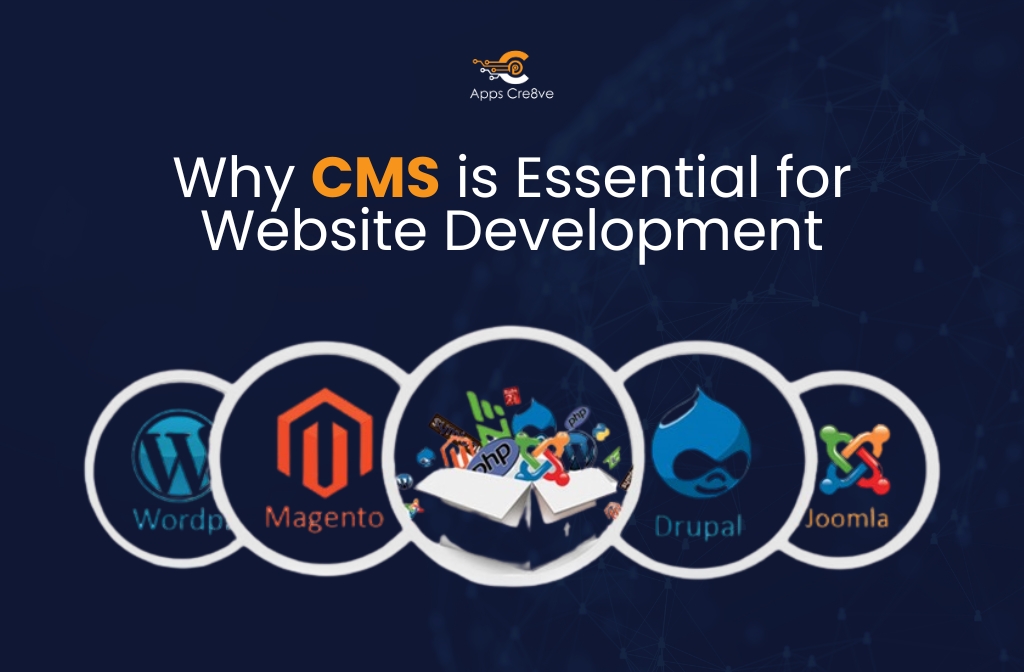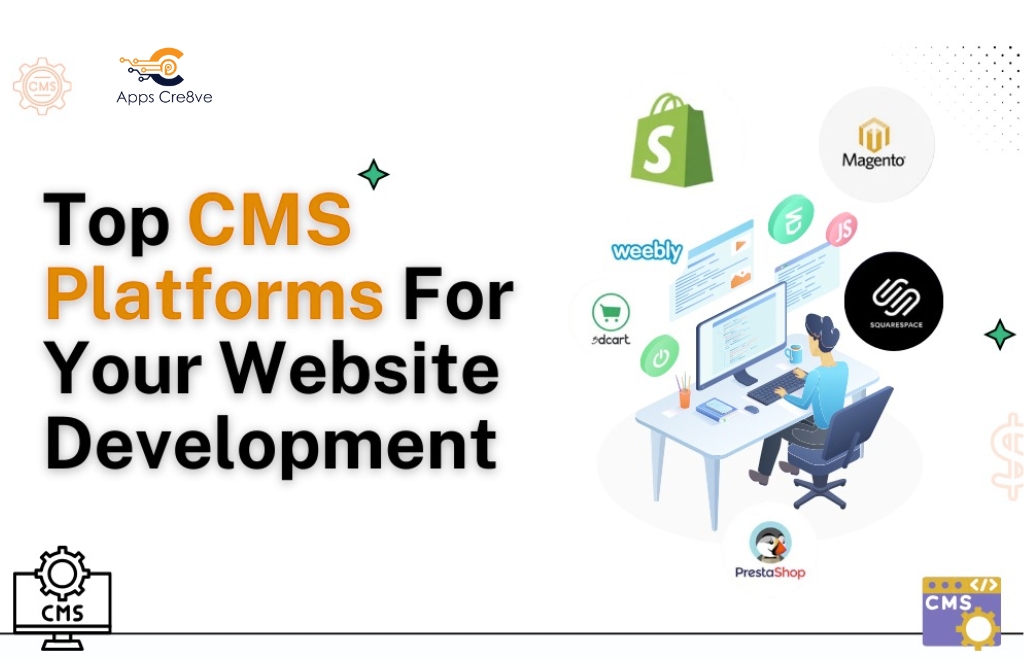Top Content Management Systems You Need to Know in 2025
6/13/2025

In the rapidly changing digital environment of 2025, it is crucial for businesses, developers, and marketers to select a Content Management System (CMS) that enables them to achieve an engaging, scalable, and seamless online experience.
CMS is a major LMC that facilitates website content management, streamlines content publishing workflows, and empowers teams to succeed in digital content management.
No matter if you are planning to create a blog, an e-commerce platform, or an enterprise-grade website, CMS platforms have both general and specialized web CMS solutions for different needs.
Let’s break down the best CMS tools for websites you should be eyeballing in 2025. Features, perks, why they’re worth your time, and how they play with all the other shiny digital experience platforms (DXP) out there. Buckle up.
What is a Content Management System (CMS)?
A Content Management System (CMS) is a software application that enables users to publish, organize, and update electronic data without any technical knowledge.
From WordPress as an open-source CMS to HubSpot CMS Hub as a proprietary CMS, and also to a headless Content management system such as Contentful, the CMS platforms are designed for creating different types of content and also for managing various tasks.
They guarantee website scalability, implement marketing automation in CMS, and offer powerful CMS user roles and permissions for effective collaboration.
The market for flexible, easy-to-use, and scalable web CMS solutions is growing exponentially in 2025. We will take a look at the most popular Content management system platforms and the ways they help businesses succeed in the digital world.
Website Development Tools: The Role of CMS in Modern Web Development
Contemporary website development tools excessively rely on CMS platforms to ease the process of creating and managing websites.
A content management system works best when powered by a reliable web development company like Apps Cre8ve, by the way, serves as the engine that lets you bind together a decent-looking site without losing your mind over code.
WordPress, Drupal, and Joomla are the top three platforms that have a plethora of plugin and theme libraries; thus, they can be considered versatile CMS tools for websites.
In the case of developers, open-source CMS platforms give them away and beyond flexibility, as they can customize the code, integrate third-party, and scale for high-traffic sites.
Proprietary CMS solutions such as Wix and Squarespace provide simple drag-and-drop interfaces, which are suitable for small businesses that want to be up and running quickly.
The debut of headless CMS has brought a complete overhaul to website development tools, as it has separated the backend from the frontend to send content to several channels, including mobile apps and IoT devices.
Why CMS is Essential for Website Development

- Ease of Use: Content can be managed by people who are not technical, with no need for coding skills.
- Scalability: Utilizes website scalability with CMS, thus being able to cope with the increasing traffic and content requirements.
- Customization: Themes, plugins, and APIs allow for custom-made solutions.
- Collaboration: CMS user roles and permissions make team workflows efficient and seamless.
- How much does a website cost for my business?
Digital Experience Platform (DXP): CMS as the Core of Digital Success
A digital experience platform (DXP) is a bigger concept than just a website content management systems (CMS); they both work together, providing analytics, personalization, and marketing automation in a CMS. In 2025,
Adobe Experience Manager and Sitecore will be the leading DXP platforms, thus they will empower businesses to craft personalized, seamless experiences across multiple channels.
A DXP that is supported by a CMS allows for uninterrupted digital content management not only on websites but also on apps and social media. Take, for example, a headless CMS like Strapi, which supplies various platforms with content; thus, a consistent user experience that is consistent is guaranteed.
Traditional CMS platforms such as WordPress cooperate with tools like Yoast SEO and Google Analytics, thus digital experience platforms are enlightened with insights regarding user behavior and content performance.
Key Features of a CMS-Driven DXP
- Personalization: Custom content depending on user choices.
- Omnichannel Delivery: Content distributed via web, mobile apps, and wearables.
- Analytics Integration: Monitors carry out performance indicators for campaign improvement.
- Scalability: Accepts enterprise-level traffic and complicated content publishing workflows.
Content Publishing Workflow: Streamlining Content Creation
The power of an efficient content publishing workflow cannot be overemphasized, and it is the driving force behind any successful CMS. In the year 2025,
Platforms such as WordPress, Contentful, and HubSpot CMS Hub will have high performance in easing the process of content writing, editing, and publishing. User-friendly interfaces, drag-and-drop editors, and collaborative tools have made workflows less complicated.
WordPress’s block editor (Gutenberg) allows users to create complicated layouts without programming; on the other hand, a headless CMS like Contentful provides APIs for smooth content transfer.
The use of the HubSpot interface in the marketing automation integrates the CMS in the process of publishing the schedules and the targeted campaigns, thus it is done automatically.
How CMS Enhances Content Publishing
- Content Scheduling: Automates dispatches for marketing synchronization.
- Team Collaboration: Distributes CMS user roles and permissions for smoothness.
- Version Control: Follows up on modifications for mistake-free releasing.
- SEO Optimization: Integrated utilities significantly enhance search engine visibility.
Website Scalability with CMS: Building for Growth
As companies grow, their websites have to be able to accommodate more traffic and content. Website scalability CMS plays an important role in CMS for enterprise websites. Websites such as Drupal and Sitecore accommodate complex sites by certified website developers with thousands of pages and high user traffic.
Open source CMS such as Joomla and Drupal provide modular architectures that are designed for scalability, and headless CMS such as Sanity allow for flexible content delivery across channels. Proprietary CMS such as Wix and Squarespace offer scalable hosting for smaller businesses.
Tips for Scalability
- Cloud-Based CMS: Use Webflow or HubSpot for scalable hosting.
- Performance Optimization: Leverage caching, CDNs, and image compression.
- Modular Design: Facilitates simple additions and modifications.
- Load Testing: Verify functionality in situations with significant traffic.
CMS for Enterprise Websites: Powering Large-Scale Presence
CMS for enterprise websites requires multi-site management capability, going worldwide with content delivery and CMS integration with CRM/ERP.
The platforms like Adobe Experience Manager, Sitecore, and Drupal lead the pack in 2025 due to their powerful features.
Experience Manager by Adobe is integrated with Adobe Marketing Cloud for marketing automation in CMS and is compatible with Salesforce for the CMS integration with CRM/ERP.
Drupal provides enterprise-grade security and customization that makes it perfect for corporate and government sites.
Why Enterprises Choose Dedicated CMS For Web & Mobile Apps
Content Management Systems dedicated to enterprise mobile apps have special features that make them so desirable:
- Multi-Site Management: Decentralized control for many web & mobile app pages.
- Global Delivery: CDNs ensure the speed of content access all over the world.
- Security: Observance of the rules of GDPR and CCPA.
- Integration: Effortless linkage to CRM and ERP.
Marketing Automation in CMS: Driving Engagement
Marketing automation in CMS has improved user engagement in 2025. HubSpot CMS Hub and Marketo Engage are examples of platforms that integrate automation tools for targeted campaigns, user tracking, and email marketing.
HubSpot also works with its CRM for personalized content delivery, whereas a headless CMS such as Contentful distributes dynamic content across channels for a better digital content management experience. Automation simplifies recurring tasks, allowing more time for strategic planning.
Benefits of Marketing Automation
- Personalized Campaigns: Content created specifically for particular user groups.
- Lead Nurturing: Sales funnels using automated email sequences.
- Analytics: Track the effectiveness of your campaigns.
- Efficiency: Post on social media and schedule tasks automatically.
CMS Integration with CRM/ERP: Unifying Operations

CMS integration with CRM/ERP makes your processes more efficient and can also improve your customer experience.
Sitecore, HubSpot, and Salesforce Experience Cloud are examples of platforms that are very good at CRM and ERP implementation system.
Sitecore carries out the integration with Salesforce for customer-centric content, whereas HubSpot CMS Hub’s connection with its CRM ensures unobstructed data transfer.
Such correspondences not only facilitate digital content management but also cater to complicated content publishing workflows.
How Integration Boosts Efficiency
- Centralized Data: A single, unified picture of client information.
- Automated Workflows: Set off events in response to user input.
- Personalization: Create customized content using mobile CRM data.
- Streamlined Operations: Minimize the amount of manual data entry.
CMS User Roles and Permissions: Empowering Collaboration
Effective CMS user roles and permissions guarantee safe and efficient cooperation. WordPress, Drupal, and Contentful allow detailed permission configurations among editors, designers, and developers.
WordPress hires roles such as Administrator and Editor, whereas a headless CMS like Sanity gives API-based permissions for custom roles.
Such functionalities are essential for CMS for enterprise websites that have large teams.
Best Practices for User Roles
- Clear Roles: Prevent permission overlap.
- Limited Admin Access: Only allow trustworthy users.
- Regular Audits: Conduct routine audits to verify security compliance.
- Training: Inform groups about the features of CMS.
Top CMS Platforms to Watch in 2025

Here’s a chart that compares major CMS platforms in 2025, pinpointing their specialty use cases:
| CMS Platform | Type | Ease of Use | Customization | Scalability | Best For |
| WordPress | Open-Source CMS | High | High | Moderate | Blogs, SMEs, E-commerce |
| Drupal | Open-Source CMS | Moderate | Very High | High | Enterprise, Complex Sites |
| HubSpot CMS Hub | Proprietary CMS | High | Moderate | High | Marketing, CRM Integration |
| Contentful | Headless CMS | Moderate | High | Very High | Omnichannel, Developer-Friendly |
| Adobe Experience Manager | Proprietary CMS | Moderate | Very High | Very High | Enterprise, Personalization |
- WordPress: With a wide range of plugins, it’s flexible for blogs and small businesses.
- Drupal: The best CMS for enterprise websites.
- HubSpot CMS Hub: Proficient in CRM and CMS integration and marketing automation.
- Contentful: Ideal for omnichannel digital content management with headless CMS.
- Adobe Experience Manager: The industry-leading digital experience platform (DXP) for businesses is Adobe Experience Manager.
Final Verdict:
In 2025, Content Management Systems are the foundation of website content management, facilitating businesses to design, control, and grow digital experiences.
The right CMS can change your digital game from an open-source CMS like WordPress to a headless CMS like Contentful and a proprietary CMS like HubSpot.
By utilizing website development tools, digital experience platforms (DXP), and marketing automation in CMS, businesses have the ability to provide customized content at a large scale.
Pick a CMS that is compatible with your objectives for web scalability, content publishing workflows, and CMS integration with CRM/ERP if you want to remain competitive in the digital race.
FAQs
What distinguishes headless CMS from traditional CMS?
A traditional CMS integrates content management and presentation, whereas a headless CMS separates the backend, providing content over APIs to various platforms.
What CMS is the most suitable for small companies?
Proprietary CMS such as Wix and Squarespace are perfect for small companies that want an easy-to-use and friendly platform. WordPress is an open-source CMS that is very customizable.
Can CMS integrate with marketing tools?
Ofcourse, for increased efficiency, platforms such as HubSpot and Sitecore provide marketing automation in CMS and CMS interaction with CRM/ERP.
What is the best CMS for enterprise websites?
CMS for enterprise websites, such as Adobe Experience Manager, Sitecore, and Drupal, provides scalability, security, and strong integration.
How can I pick a CMS that will scale over time?
To guarantee website scalability with CMS for expanding traffic and content needs, choose a CMS with cloud hosting, flexible architecture, and CDN support, such as Drupal or Contentful.